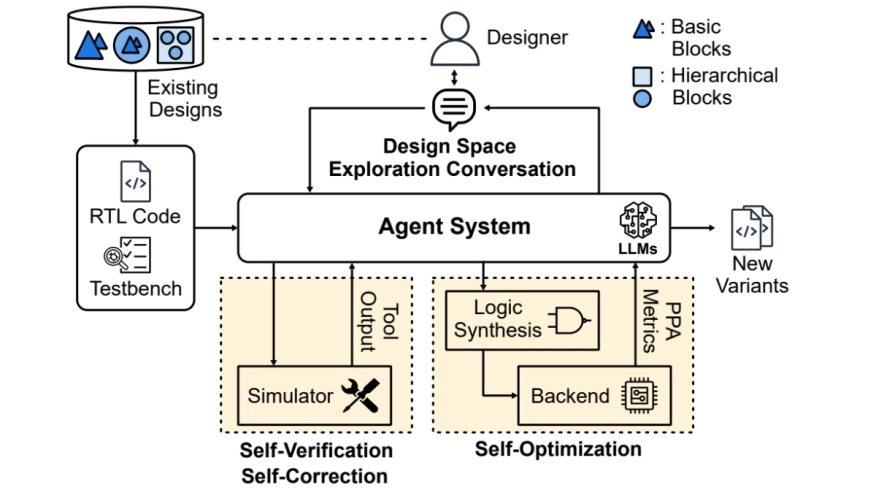CRADLE: Conversational RTL Design Space Exploration with LLM-based Multi-Agent Systems
By Lukas Krupp, Maximilian Schoffel, Elias Biehl, and Norbert Wehn ¨
RPTU University of Kaiserslautern-Landau, Kaiserslautern, Germany

Abstract
 This paper presents CRADLE, a conversational framework for design space exploration of RTL designs using LLM-based multi-agent systems. Unlike existing rigid approaches, CRADLE enables user-guided flows with internal selfverification, correction, and optimization. We demonstrate the framework with a generator-critic agent system targeting FPGA resource minimization using state-of-the-art LLMs. Experimental results on the RTLLM benchmark show that CRADLE achieves significant reductions in resource usage with averages of 48% and 40% in LUTs and FFs across all benchmark designs.
This paper presents CRADLE, a conversational framework for design space exploration of RTL designs using LLM-based multi-agent systems. Unlike existing rigid approaches, CRADLE enables user-guided flows with internal selfverification, correction, and optimization. We demonstrate the framework with a generator-critic agent system targeting FPGA resource minimization using state-of-the-art LLMs. Experimental results on the RTLLM benchmark show that CRADLE achieves significant reductions in resource usage with averages of 48% and 40% in LUTs and FFs across all benchmark designs.
Index Terms—LLM, Agents, Design Space Exploration, RTL
To read the full article, click here
Related Semiconductor IP
- Multi-channel Ultra Ethernet TSS Transform Engine
- Configurable CPU tailored precisely to your needs
- Ultra high-performance low-power ADC
- HiFi iQ DSP
- CXL 4 Verification IP
Related Articles
- Veri-Sure: A Contract-Aware Multi-Agent Framework with Temporal Tracing and Formal Verification for Correct RTL Code Generation
- Simultaneous Exploration of Power, Physical Design and Architectural Performance Dimensions of the SoC Design Space using SEAS
- Simultaneous Exploration of Power, Physical Design and Architectural Performance Dimensions of the SoC Design Space using SEAS
- Configure, Confirm, Ship: Build Secure Processor-Based Systems with Faster Time-to-Market
Latest Articles
- GenAI for Systems: Recurring Challenges and Design Principles from Software to Silicon
- Creating a Frequency Plan for a System using a PLL
- RISCover: Automatic Discovery of User-exploitable Architectural Security Vulnerabilities in Closed-Source RISC-V CPUs
- MING: An Automated CNN-to-Edge MLIR HLS framework
- Fault Tolerant Design of IGZO-based Binary Search ADCs